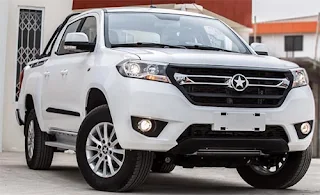Ghana car company Kantanka Cars and Trucks are made in Africa by Africans.
Kantanka car manufacturing company is Ghana's first carmaker.
Founder of Kantanka Automobile Company and the Kantanka Group is Apostle Dr. Ing.
Kwadwo Safo Kantanka. He is also the founder of the Christ Reformed Church and
known as the Star of Africa, which is the same emblem, used on the hood of his
Kantanka car line.

|
|
Ghana's Kantanka Omama Luxury Pickup
|
Kantanka Automobile is a Ghanaian-based car manufacturing company that
was founded by Apostle Dr. Ing. Kwadwo Safo Kantanka in 1998. Kantanka Was
established in 1994, and became a limited liability company in 2004. Before he
started the car manufacturing business, Apostle Safo was known for his
expertise in the field of electrical engineering, and he made a name for
himself by inventing various technological innovations in Ghana.
In 1998, Apostle Safo ventured into the automotive industry by assembling his
first car, the Kantanka Saloon. He used his engineering skills to design and
manufacture the car using local materials and labor. The car was well received
by Ghanaians, and it led to the establishment of the Kantanka Automobile
Company.
Today, Kantanka Automobile is a leading car manufacturing company in Ghana,
producing a range of cars that includes SUVs, pickup trucks, sedans and hatchback cars.
The company employs over 300 workers, several showrooms and service centers across the country.
The cars manufactured by Kantanka Automobile are designed to meet the needs
and preferences of Ghanaians and other Africans. The company uses locally
sourced materials and labor to manufacture its cars, which helps to support
the local economy. The manufacturing process involves a combination of
traditional and modern methods, with much of the work done by hand.
The cars are assembled at the company's manufacturing plant in Gomoa Mpota,
which is located in the Central Region of Ghana. The company has grown to
become a leading car manufacturer in Ghana, and it continues to expand its
operations to other African countries.
Note
As of April 2023 Kantanka Automobile has shipped cars to Norway but not to the United States or any other country outside of the continent of Africa we will keep you posted.






